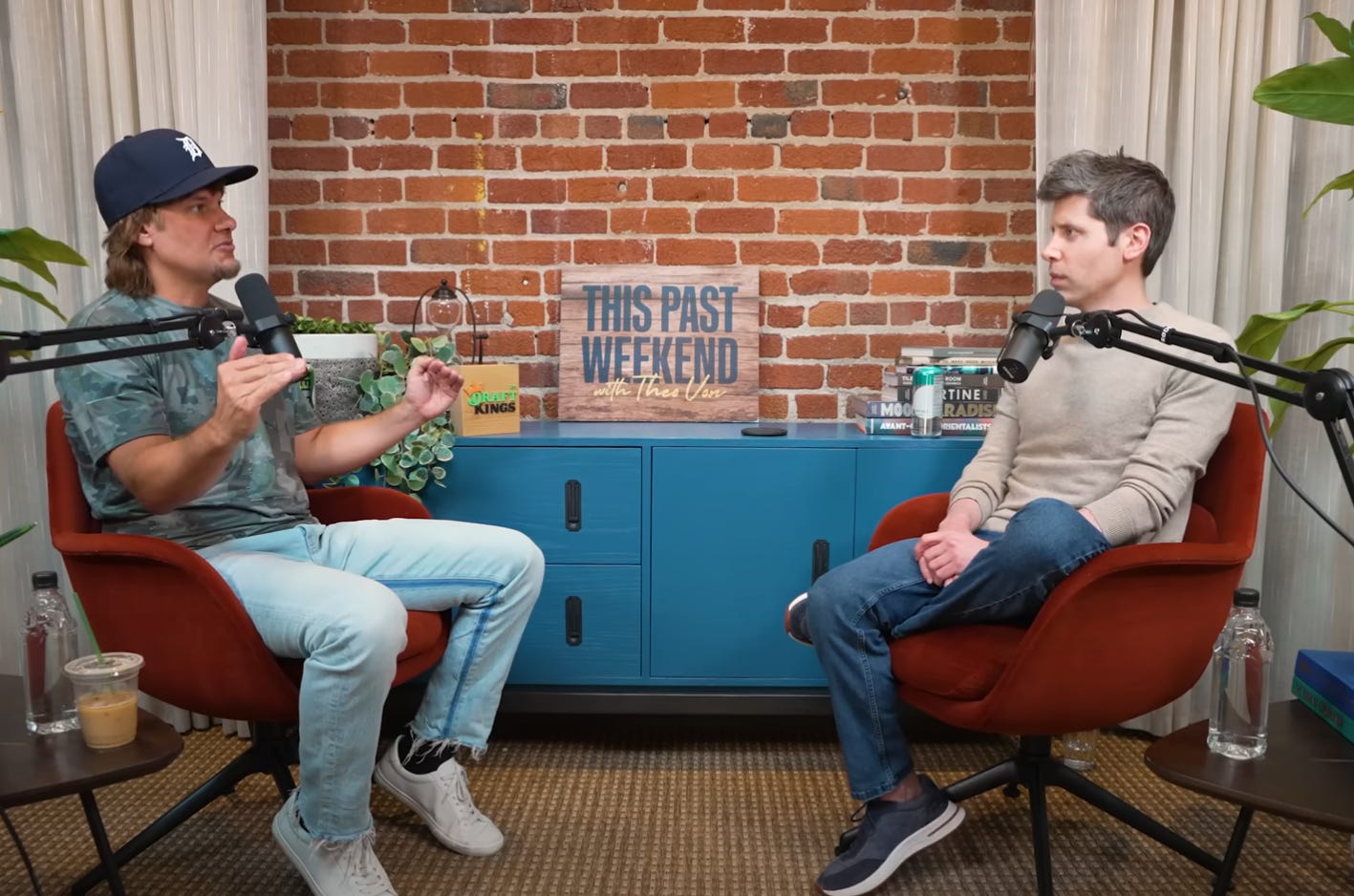Von Interviews Altman: The Rhetoric of Progress
The arc of history bends upward, apparently
Last week, comedian Theo Von interviewed Sam Altman.

I embedded two clips from the interview in this Substack post, but if you have trouble playing them below, you can find the first here and the second here.
Among other things, the two discussed:
The future of education
Changes to the workplace (and the notion of work)
How old people aren’t going to like AI (but how they’re going to deal with it because that’s just the way the cookie crumbles)
Humans being born outside the womb as commonplace in the future
AI tokens as currency
At one point, Von asked,
“Do you guys feel like the new government kind of? Or do you feel like the government is still like a real thing?”
Altman said he didn’t feel like the government in any way. He remembers when Trump bombed Iran and thinking to himself, “Oh, that’s what actual power looks like….” However, if the Internet is to the soul what the atomic bomb is to the body (as per Anton Barba-Kay), then OpenAI and the US Government aren’t so different, you see.
To his credit, Altman handled the interview well. Near the end, Von said how much he appreciated getting to meet Sam. Talking with him made him more hopeful (and perhaps “whimsical”).
At the end Altman describes the path of AI as a winding road. We just can’t see around the curves. This metaphor, however, differs from the grand vision he presented throughout the interview.
Winding Road, Arc, or Both?
The god of Progress is alive and well in our technologists’ rhetoric. Altman mentioned it multiple times throughout the interview.
Yeah.
So much for that winding road where we can’t see around the corner. Apparently, Altman can see the future, and it looks like a nice upward ascent.
In 1953 Richard Weaver wrote,
It is best to begin boldly by asking ourselves, what is the ‘god term’ of the present age? By ‘god term’ we mean that expression about which all other expressions are ranked as subordinate and serving dominations and powers.
Weaver continued,
Its force imparts to the others their lesser degree of force, and fixes the scale by which degrees of comparison are understood. In the absence of a strong and evenly diffused religion, there may be several terms competing for this primacy, so that the question is not always capable of definite answer. Yet if one has to select the one term which in our day carries the greatest blessing, and—to apply a useful test—whose antonym carries the greatest rebuke, one will not go far in naming ‘progress.’
Without the hope of Progress, how else could you get $500 billion to build data centers in the US?
You see, we’ve already been sold this narrative. Christopher Lasch called it the true and only heaven. It is the upward arc of history, the progressive vision of the future.
What’s Weaver’s answer to such rhetorical bewitchment? Dialectic, of course. We have to ask: “What do you mean by Progress, Sam? Progress for whom? And Progress towards what?”
To combine Altman’s metaphors, we could say that we’re on some upward yet winding road where we both can and cannot see where we’re going.
Even if this weren’t a contradiction, it would still beg the question: Who’s driving? And who let him behind the wheel in the first place?
Once again, if the videos above won’t play, you can find them here and here.



Yes, for sure!
Also just finished a reread of Han's "In the Swarm." If you haven't started another book of his yet that would be the one I'd recommend to read next, as in some ways it picks up where 'The Burnout Society' left off.
Just picked up Karen Hao's "Empire of AI," which tells the Altman story and relates it to the AI quest overall. I'm only a couple chapters in and already it's getting scary. Hao is a journalist with an engineering degree from MIT who has been writing about AI/digital tech since 2018.